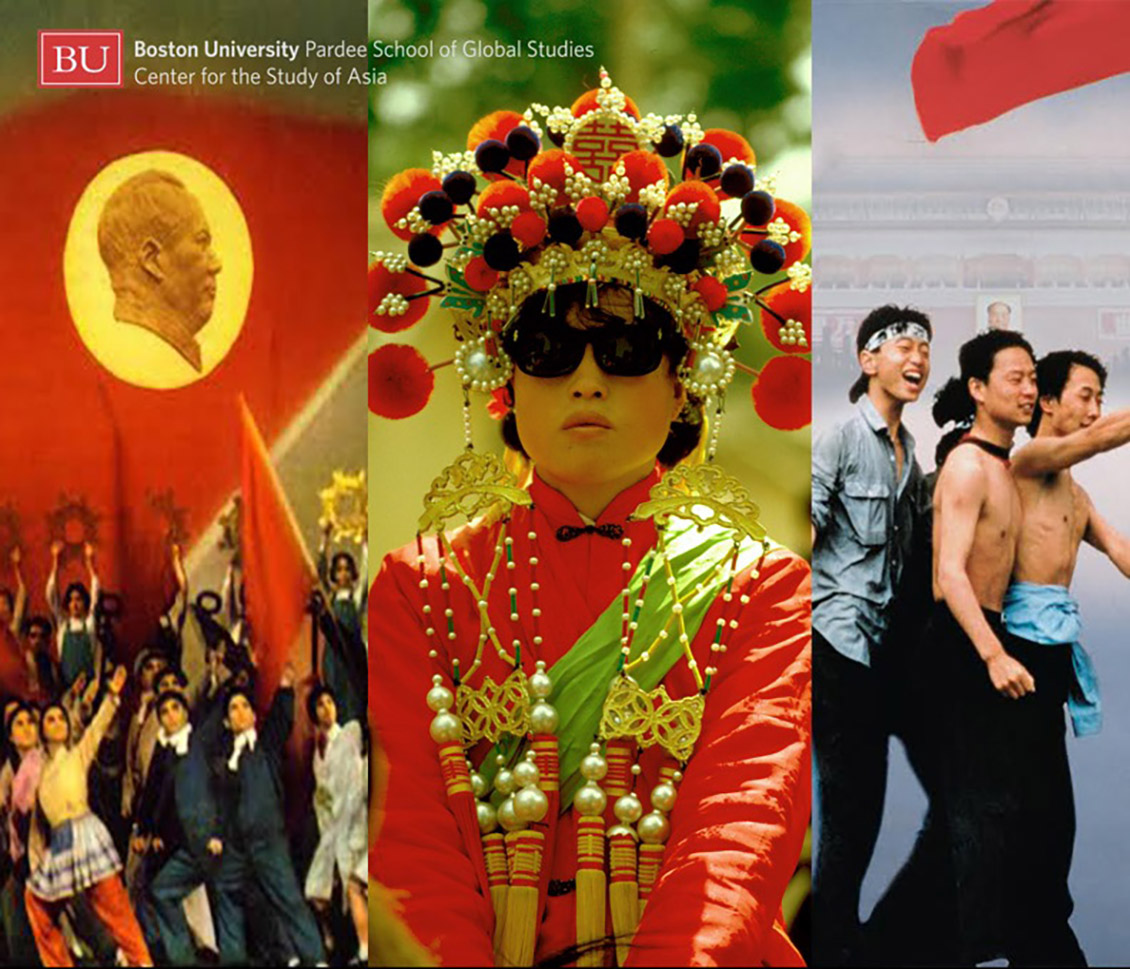History in Images, History in Words: In Search of Facts in Documentary Filmmaking
History in Images, History in Words:
In Search of Facts
in Documentary Filmmaking
A lecture by Carma Hinton
Robinson Professor of Visual Culture and Chinese Studies at George Mason University
Monday April 10, 2017 from 4-7 pm
at the Photonics Center (9th fl.), 8 St. Mary’s Street, Boston University
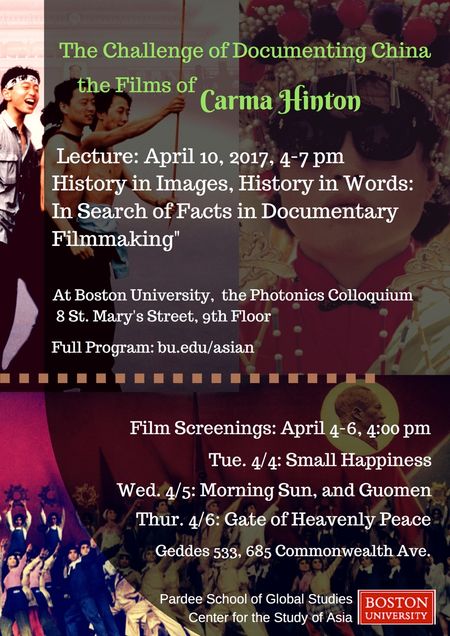 My presentation will focus on the process of documentary filmmaking, especially the many challenges my team and I faced in trying to create engaging filmic narratives that are both factually accurate and encompass multiple perspectives. I will use excerpts from my films as well as out-takes to illustrate the difficulties in determining what information to include and exclude, assess the compromises involved in the choices, and explore the consequences of taking various possible paths. I will also address the different problems that a historian encounters when presenting history in images as opposed to in words: the potential and limitation of each medium and what information each might privilege or obscure. I believe that in this age of “alternative facts” and “parallel universes,” reflections on the challenges in obtaining authenticity and truth and the importance of relentlessly striving to reach this goal, take on particularly urgent meaning.
My presentation will focus on the process of documentary filmmaking, especially the many challenges my team and I faced in trying to create engaging filmic narratives that are both factually accurate and encompass multiple perspectives. I will use excerpts from my films as well as out-takes to illustrate the difficulties in determining what information to include and exclude, assess the compromises involved in the choices, and explore the consequences of taking various possible paths. I will also address the different problems that a historian encounters when presenting history in images as opposed to in words: the potential and limitation of each medium and what information each might privilege or obscure. I believe that in this age of “alternative facts” and “parallel universes,” reflections on the challenges in obtaining authenticity and truth and the importance of relentlessly striving to reach this goal, take on particularly urgent meaning.
About the speaker:
Carma Hinton is an art historian and a filmmaker. She received her Ph.D. in Art History from Harvard University and is now Robinson Professor of Visual Culture and Chinese Studies at George Mason University. Together with Richard Gordon, Hinton has directed many documentary films, including Small Happiness, All Under Heaven, To Taste a Hundred Herbs, Abode of Illusion: The Life and Art of Chang Dai-chien, The Gate of Heavenly Peace, and Morning Sun. She has won two Peabody Awards, the American Historical Association’s John E. O’Connor Film Award, the International Critics Prize and the Best Social and Political Documentary at the Banff Television Festival, and a National News & Documentary Emmy, among others. Hinton is currently working on a book about Chinese scrolls depicting the theme of demon quelling. Carma Hinton was born in Beijing. Chinese is her first language and culture.

CAMLab Conference: Chinese Kinesthetic Forms (at Harvard, Nov 11 and Nov 12, 2022 all day)

Chinese Kinesthetic Forms
Friday November 11 (all day) and Saturday Nov. 12, 2022 (all day)
Lower-level lecture hall of 485 Broadway building, Harvard University, Cambridge MA 02138
Movement has a distinctively rich tradition in China. Chinese Kinesthetic Forms considers movement as an organizing principle across myriad media and cultural forms—from dance and music, to painting and calligraphy, to theater and martial arts. The conference explores how movement, as both expression and object of perception, opens experiential dimensions, even beyond the corporeal. Coinciding with the presentation of installations from CAMLab’s Cave Dance project, the conference joins fresh conversations on dance, kinesthetics, and China’s long history of performance, and it seeks to further understanding of movement as a way of defining experience.
This conference is organized by Harvard FAS CAMLab, with support from the Department of History of Art and Architecture.
Schedule
(from https://haa.fas.harvard.edu/event/camlab-conference-chinese-kinesthetic-forms)
Thursday, November 10
7:30 PM Welcome dinner for speakers, location TBC
Friday, November 11
9:00–9:30 AM Morning coffee
9:30–10:30 AM Keynote
“When and How Did Art Become Art? Crane Dances in Chinese Imagination,” Eugene Wang, Harvard University
Discussant: TBC
10:30–11:00 AM Break
11:00–12:30 PM The Lightness of Being: Sensorial Kinesthetics
“Flame and Fragrance: The Bodiless Body of Dancing Apsaras in Medieval Buddhist Art,” Chenchen Lü, Harvard University
“Taking Flight: The Modern Art of the Apsaras in East Asia,” Anne Feng, Boston University
Panel Discussant: Thomas Kelly, Harvard University
Panel Chair: Alice Tseng, Boston University
12:30–1:00 PM Lunch
1:00–3:00 PM Sword Dance: Three Readings of Lady Gongsun
“Where the Feet Touch the Ground,” Stephen Owen, Harvard University
“The Phantom of the Dance,” Xiaofei Tian, Harvard University
“Sharp Turns, Indirect Transmission, and the Unity of the Arts,” Lucas Bender, Yale University
Panel Discussant: Wai-yee Li, Harvard University
Panel Chair: Michael Szonyi, Harvard University
3:00–3:30 PM Coffee break
3:30–5:00 PM Reviving Repertoire: Dunhuang Dance, Then and Now
“Representations of Tang Dance Events and Bodily Cultures in Dunhuang,” Muyun Zhou, Pennsylvania State University
“From Wall to Stage: Flowers and Rain on the Silk Road (1978) and the Making of Contemporary Dunhuang Dance,” Emily Wilcox, College of William & Mary
Panel Discussant: TBC
Panel Chair: Rowan Flad, Harvard University
5:00–7:00 Conference reception in the Living Room (on 4th floor of 485 Broadway)
7:30 PM Dinner for conference participants at Nubar, Commander Hotel
Saturday, November 12
8:30–9:00 AM Morning coffee
9:00–11:00 AM Furor and Festivity: The Song-Yuan Turn
“No More Fear: How Did the Southern Song Nuo Exorcists Cope with Pandemics?” Huiping Pang, Hangzhou Normal University
Discussant: Heping Liu, Wellesley College
“Tage (Stomping Songs): Images of Rural Festive Dancing in Chinese Paintings,” Wen-chien Cheng, Royal Ontario Museum
Discussant: Heping Liu, Wellesley College
“Demonic Divine: Reassessing ‘Dance of the Sixteen Heavenly Devils’ in the Mongol-Yuan Court”
Yin Xiaotian, Harvard University
Discussant: Jinah Kim, Harvard University
Panel Chair: Leonard van der Kuijp, Harvard University
11:00 AM–12:30 PM Calligraphic Kinesthetics
“Martial Heroics in the Calligraphy and Painting of Xu Wei,” Kathleen Ryor, Carleton College
“Like the Splash of a Great Whale Rising: Motion in the Criticism and Practice of ‘Mad Cursive’ Calligraphy,” Amy McNair, University of Kansas
Panel Discussant: Aida Yuen Wong, Brandeis University
Panel Chair: Jeffrey Moser, Brown University
12:30–1:30 PM Lunch
1:30–3:30 PM Kinesthetic Media
“Haptic Vision: Kinetic Architecture in Middle-Period China,” Jeehee Hong, McGill University
Discussant: Aurelia Campbell, Boston College
Discussant: Eugene Wang, Harvard University
“Recreating the Sword-dance, Reinventing Qiu Jin (1875–1907),” Hu Ying, University of California, Irvine
Discussant: Weihong Bao, University of California, Berkeley
Panel Chair: Christina Yu Yu, Museum of Fine Arts, Boston
3:30–4:00 PM Coffee break
4:00–5:00 PM From Immersion to Access: Lenora Lee Dance’s Filmic Remediation
Lenora Lee, Lenora Lee Dance
SanSan Kwan, University of California, Berkeley
Moderator: Simone Levine, Harvard FAS CAMLab
5:00–6:30 PM Viewing sessions for conference participants of CAMLab Cave installations
7:00 PM Dinner for conference participants at Henrietta’s Table, The Charles Hotel

Contemporary Chinese Culture Lecture: “Airing Grievances & the Atmospherics of Chinese Legal Reforms” with Dr. Julie Chu (Tuesday, Nov 8, 2022)
Please join the Boston University Anthropology Department for its first Contemporary Chinese Culture Lecture:
“Airing Grievances & the Atmospherics of Chinese Legal Reforms”
Dr. Julie Chu (Univ. of Chicago)
Tuesday, November 8, 2022 at 3:30 pm
in CAS 132, 725 Commonwealth Ave, Boston MA 02215
Please RSVP here: https://www.eventbrite.com/e/contemporary-chinese-culture-lecture-tickets-444736116697
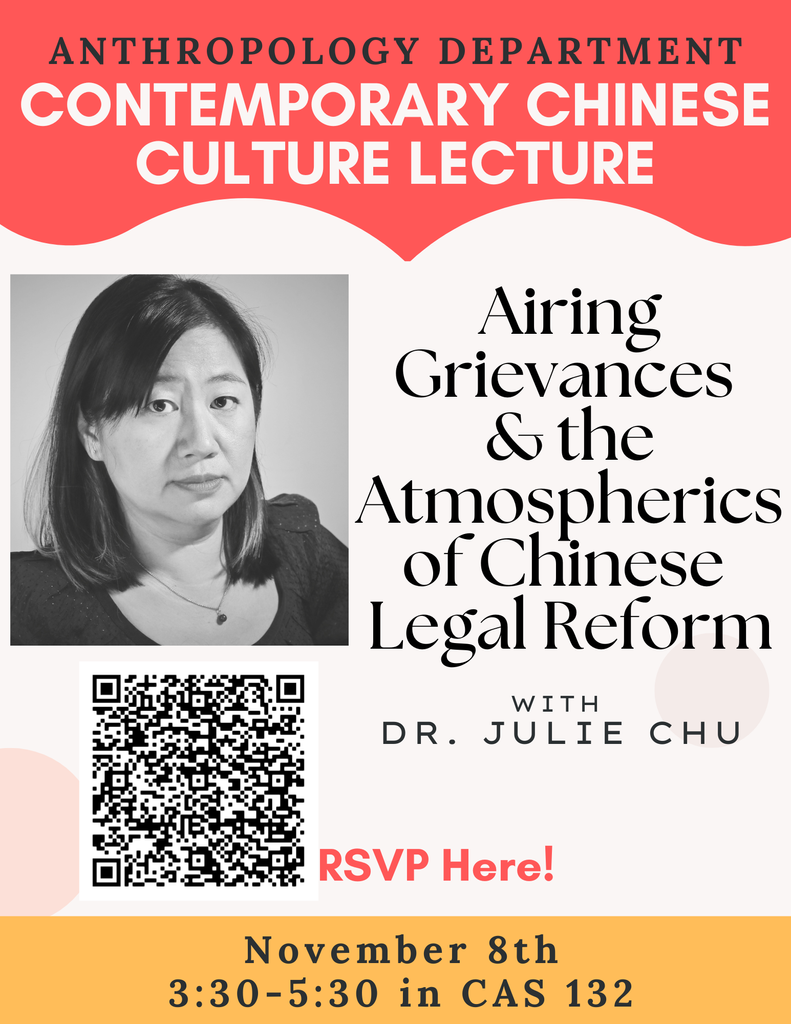
This talk considers the ways in which legal reform unfolds as a palpable, if vague, “change in the air” in new zones of urban revitalization and port development in contemporary China. Drawing from various examples of citizen-state struggles over the spread of bad air(s) throughout the rezoned areas of coastal Fuzhou (e.g. the free trade port zone, the touristic city center), I show how redevelopment as filtered through “the law” can operate as a distinctive infrastructural project of climate control to shape the atmospherics of civilian protest; this includes gathering unlikely allies together under a shared cloud of political disaffection and procedural noise to ponder the revolutionary and everyday possibilities of social change in China beyond the current governing logics of “reform."
About the Speaker:
Julie Y. Chu, an Associate Professor of Anthropology and Social Sciences in the College at the University of Chicago, is a sociocultural anthropologist with interests in mobility and migration, 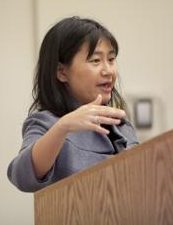 economy and value, ritual life, material culture, media and technology, and state regulatory regimes. Her book, Cosmologies of Credit: Transnational Mobility and the Politics of Destination in China (Duke University Press, 2010), received the 2011 Sharon Stephens Prize from the American Ethnological Society and the 2012 Clifford Geertz Prize from the Society for the Anthropology of Religion. It was also shortlisted for the 2011 Gregory Bateson Prize from the Society of Cultural Anthropology. Her current writing project is entitled The Hinge of Time: Infrastructure and Chronopolitics at China's Global Edge. Based on three years of fieldwork largely among Chinese customs inspectors and transnational migrant couriers traversing the Taiwan Strait, the Indian Ocean and the Pacific (via ports and border zones spanning the PRC and the U.S.), this work examines how certain figures of "infrastructure" animate the global politics of time in three distinct keys -- as matters of constancy, rhythm and non/event.
economy and value, ritual life, material culture, media and technology, and state regulatory regimes. Her book, Cosmologies of Credit: Transnational Mobility and the Politics of Destination in China (Duke University Press, 2010), received the 2011 Sharon Stephens Prize from the American Ethnological Society and the 2012 Clifford Geertz Prize from the Society for the Anthropology of Religion. It was also shortlisted for the 2011 Gregory Bateson Prize from the Society of Cultural Anthropology. Her current writing project is entitled The Hinge of Time: Infrastructure and Chronopolitics at China's Global Edge. Based on three years of fieldwork largely among Chinese customs inspectors and transnational migrant couriers traversing the Taiwan Strait, the Indian Ocean and the Pacific (via ports and border zones spanning the PRC and the U.S.), this work examines how certain figures of "infrastructure" animate the global politics of time in three distinct keys -- as matters of constancy, rhythm and non/event.
A graduate of NYU’s Program in Culture and Media, she is also currently completing video and other multimedia projects related to her fieldwork as well as developing two new ethnographic foci:
(1) on Chinese soundscapes, especially in relation to the changing qualities and valuations of the Chinese concept of renao (热闹, a bustling scene, social liveliness or, literally, “heat and noise”)
(2) on the politics and poetics of logistics, especially in relation to e-commerce driven innovations in moving goods, people and information according to increasing aspirations for on-demand, seamless "fulfillment." This includes launching the collaborative research project, "Logistics in the Making of Mobile Worlds," the cross-platform online discussion of #Logistics in the Time of Covid, and the Spring 2022 issue of Roadsides on #Logistics
[bio from https://anthropology.uchicago.edu/people/faculty/julie-chu]
Congrats to Sunil Sharma and his collaborators on their new book, Three Centuries of Travel Writing by Muslim Women
Published by Indiana University Press, August 2022.
When thinking of intrepid travelers from past centuries, we don't usually put Muslim women at the top of the list. And yet, the stunning firsthand accounts in this collection completely upend preconceived notions of who was exploring the world.
Description from https://iupress.org/9780253062390/three-centuries-of-travel-writing-by-muslim-women/#generate-pdf
 Editors Siobhan Lambert-Hurley, Daniel Majchrowicz, and Sunil Sharma recover, translate, annotate, and provide historical and cultural context for the 17th- to 20th-century writings of Muslim women travelers in ten different languages. Queens and captives, pilgrims and provocateurs, these women are diverse. Their connection to Islam is wide-ranging as well, from the devout to those who distanced themselves from religion. What unites these adventurers is a concern for other women they encounter, their willingness to record their experiences, and the constant thoughts they cast homeward even as they traveled a world that was not always prepared to welcome them.
Editors Siobhan Lambert-Hurley, Daniel Majchrowicz, and Sunil Sharma recover, translate, annotate, and provide historical and cultural context for the 17th- to 20th-century writings of Muslim women travelers in ten different languages. Queens and captives, pilgrims and provocateurs, these women are diverse. Their connection to Islam is wide-ranging as well, from the devout to those who distanced themselves from religion. What unites these adventurers is a concern for other women they encounter, their willingness to record their experiences, and the constant thoughts they cast homeward even as they traveled a world that was not always prepared to welcome them.
Perfect for readers interested in gender, Islam, travel writing, and global history, Three Centuries of Travel Writing by Muslim Women provides invaluable insight into how these daring women experienced the world—in their own voices.
Weng Family Collection of Chinese Painting: Art Rocks (at the Boston MFA March 26, 2022–May 3, 2023)
Celebrating a landmark gift of Chinese art
翁氏家藏精品展·第三期:奇石拙趣
In China, rocks in their natural form are objects of great aesthetic appreciation. As far back as one thousand years ago, serious art collectors and critics acquired and competed for rocks with the same passion they afforded great works of painting and calligraphy.
 Rather than celebrating superficial beauty, collectors exalted imperfection for its expressive possibilities and sought rocks that were not symmetrical or smooth or pretty. They used terms like strange, weird, and awkward as complimentary descriptions of the rocks they most preferred. The humble rock became, like an abstract sculpture, a medium to explore forms and textures, and to express one’s inner being. In the minds of serious connoisseurs, rocks, as microcosms of mountains—or even the entire universe—were meditations on life itself.
Rather than celebrating superficial beauty, collectors exalted imperfection for its expressive possibilities and sought rocks that were not symmetrical or smooth or pretty. They used terms like strange, weird, and awkward as complimentary descriptions of the rocks they most preferred. The humble rock became, like an abstract sculpture, a medium to explore forms and textures, and to express one’s inner being. In the minds of serious connoisseurs, rocks, as microcosms of mountains—or even the entire universe—were meditations on life itself.
From 2018 to 2021, Wan-go H. C. Weng (1918–2020) made the largest gift of Chinese paintings and calligraphy to the MFA in the institution’s history, comprising more than 390 objects acquired and passed down through six generations of his family. Rocks were integral to the Weng family’s art collection, as subjects of paintings and as art objects themselves.
This exhibition features more than 25 works from the gift as well as the MFA’s collection that explore how rock aesthetics have permeated architecture, landscape design, and painting styles in China for a millennium. Visitors can envision themselves in paintings of gardens where colossal rocks loom over a scholar’s studio, or scenes of fantastical caves where artists gaze in awe at mysterious rock formations. And rocks of all kind—large and small, weird and imperfect—are on view throughout the gallery, welcoming viewers to ponder, explore or, like the ancient poets, venerate.
This is the third in a series of three exhibitions celebrating the landmark donation made by Wan-go H. C. Weng, a longtime supporter of the MFA who, until he passed away in 2020 at the age of 102, devoted his life to the preservation, study, and promotion of China’s cultural heritage.
Generously supported by the Tan Family Education Foundation.
[This description is taken from the website https://www.mfa.org/exhibition/weng-family-collection-of-chinese-painting-art-rocks]
Challenges in the Conservation of Ancient Manuscripts from Dunhuang, China (Asian Cultural Heritage Forum), Wednesday Nov 2, 2022
The Asian Cultural Heritage Forum (ACHF) Lecture Series and the CAS Archaeology Seminar Series are very pleased to present
Dr. Jianlan Wang
(Shanghai Institute of Visual Arts, and Visiting Researcher, BU Archaeology Program)

Join us in person in the Gabel Museum (in BU's Stone Science Building Room 253, 675 Commonwealth Ave. Boston)
or by Zoom at https://bostonu.zoom.us/j/8337569088?pwd=N3JXTjFURDBCUFdhVUpQVi84em9SUT09
About the speaker:
 Dr. Jianlan Wang is an associate professor in the School of Conservation at the Shanghai Institute of Visual Arts in Shanghai, China. She teaches a range of courses on conservation science dedicated to the education and development of the next generation of heritage conservators. Dr. Wang earned her MSc. In Organic Chemistry at Nanjing Forestry University, and her PhD in Chemistry at Queen’s University, Belfast, UK. We are delighted that she is spending the Fall 2022 semester as a Visiting Researcher in the Boston University CAS Archaeology Program.
Dr. Jianlan Wang is an associate professor in the School of Conservation at the Shanghai Institute of Visual Arts in Shanghai, China. She teaches a range of courses on conservation science dedicated to the education and development of the next generation of heritage conservators. Dr. Wang earned her MSc. In Organic Chemistry at Nanjing Forestry University, and her PhD in Chemistry at Queen’s University, Belfast, UK. We are delighted that she is spending the Fall 2022 semester as a Visiting Researcher in the Boston University CAS Archaeology Program.
Dr. Wang has worked collaboratively with the International Dunhuang Project (IDP) in the British Library on the conservation of silk and paper manuscripts from the Tang Dynasty (618-908 CE) from the Mogao Caves at Dunhuang, now part of the Aurel Stein Collection in the British Library. Her recent work includes non-destructive analysis and identification of archaeological organic materials; new approaches to the analysis and conservation of archaeological materials, and the evolving nature of conservation ethics.
The conservation of cultural heritage materials has developed into an increasingly interdisciplinary field, and this presentation will focus on issues and challenges surrounding the conservation of ancient Buddhist manuscripts, specifically on the study of silk-faced manuscripts from the Mogao Caves at Dunhuang.
Power and Perspective: Early Photography in China (Peabody Essex Museum, on view through April 2, 2023)
https://www.pem.org/exhibitions/power-and-perspective-early-photography-in-china
Power and Perspective: Early Photography in China explores how the camera transformed the way we imagine China. Photography’s development as a new form of art and technology in the 19th century coincided with profound changes in the way China engaged with the world. The medium evolved in response to war, trade, travel, and a desire for knowledge about an unfamiliar place.
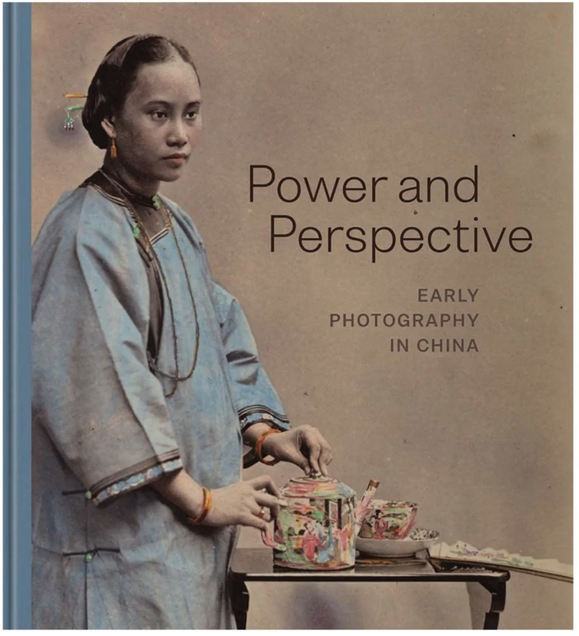 The exhibition features 130 photographs in dialogue with paintings, decorative arts, and prints drawn largely from PEM’s outstanding collections with select loans from public and private collections. Power and Perspective provides a rich account of the exchanges between photographers, artists, patrons and subjects in treaty port China, offering a vital reassessment of the colonial legacy of the medium. By calling attention to the power dynamics at play, the exhibition sheds light on photography as an inherently social medium that continues to shape our perspectives today.
The exhibition features 130 photographs in dialogue with paintings, decorative arts, and prints drawn largely from PEM’s outstanding collections with select loans from public and private collections. Power and Perspective provides a rich account of the exchanges between photographers, artists, patrons and subjects in treaty port China, offering a vital reassessment of the colonial legacy of the medium. By calling attention to the power dynamics at play, the exhibition sheds light on photography as an inherently social medium that continues to shape our perspectives today.
A major publication, distributed by Yale University Press, accompanies the exhibition.
 Power and Perspective: Early Photography in China is organized by the Peabody Essex Museum. The exhibition is made possible by the generosity of Dr. Edward G. Tiedemann Jr., the Richard C. von Hess Foundation, and the E. Rhodes and Leona B. Carpenter Foundation. Additional generous support was provided by Stephan Loewentheil, Henry Birdseye Weil and Ann Uppington, Xiaohua Zhang and Quan Zhou, the Lee and Juliet Folger Fund, the Blakemore Foundation, Robert and Bobbie Falk and two anonymous donors. Thank you to PEM supporters Carolyn and Peter S. Lynch and The Lynch Foundation and the individuals who support the Exhibition Incubation Fund: Jennifer and Andrew Borggaard, James B. and Mary Lou Hawkes, Kate and Ford O'Neil, and Henry and Callie Brauer. We also recognize the generosity of the East India Marine Associates of the Peabody Essex Museum.
Power and Perspective: Early Photography in China is organized by the Peabody Essex Museum. The exhibition is made possible by the generosity of Dr. Edward G. Tiedemann Jr., the Richard C. von Hess Foundation, and the E. Rhodes and Leona B. Carpenter Foundation. Additional generous support was provided by Stephan Loewentheil, Henry Birdseye Weil and Ann Uppington, Xiaohua Zhang and Quan Zhou, the Lee and Juliet Folger Fund, the Blakemore Foundation, Robert and Bobbie Falk and two anonymous donors. Thank you to PEM supporters Carolyn and Peter S. Lynch and The Lynch Foundation and the individuals who support the Exhibition Incubation Fund: Jennifer and Andrew Borggaard, James B. and Mary Lou Hawkes, Kate and Ford O'Neil, and Henry and Callie Brauer. We also recognize the generosity of the East India Marine Associates of the Peabody Essex Museum.
The exhibition catalogue can be found here
Book Talk: Forging Leninism in China (April 26, 2022)
Professor Joseph Fewsmith
In-person and Virtual
April 26, 2022
5PM ET
121 Bay State Road, Boston University

Book Talk: Entangled Lives: Human-Animal-Plant Histories of the Eastern Himalayan Triangle (May 6, 2022)
Professor Willem Van Schendel
University of Amsterdam

Grant Rhode delivers keynote address at “China’s Belt and Road Initiative” symposium at Bridgewater State University
Grant Rhode, Boston University Center for the Study of Asia Visiting Researcher, delivered a keynote address at the Bridgewater State University Forum China’s Belt and Road Initiative: Development Opportunities and Challenges, held April 7, 2022. The purpose of the Forum was to discuss the current state of China’s Belt and Road Initiative (BRI), with a focus on developing international opportunities that are more equivalent, balanced, and sustainable.
The faculty and student panels during the conference focused on regional cases including Egypt and the Suez Canal, the two Koreas, Pakistan and Gwadar port, the Ukraine, Russia, Turkey, and Jordan, and on topical subjects including analysis of Chinese investment patterns in the Middle East and global media framing of the BRI. Dr. Rhode’s keynote contribution provided an overview and progress report regarding important aspects of the BRI over the first eight years of its implementation.
Rhode’s keynote included a survey of his own field observations across Eurasia and the Americas, and a review of the fifteen presentations made at Boston University’s 2021 seminar program Assessing China’s Belt and Road Initiative: A Pardee School Series. This series he directed examines the economic, social, political, and security impacts of the BRI across the world’s regions. Rhode concluded with remarks comparing the BRI (2013) with emerging competing initiatives including Japan’s Partnership for Quality Infrastructure (PQI, 2015), the American Build Back Better World (B3W, 2021) initiative, and the European Global Gateway (2021) initiative. Potential impacts of the Covid-19 pandemic and the current Ukraine crisis were considered.
Dr. Grant Rhode is a Visiting Researcher at the Center for the Study of Asia and a Senior Lecturer at the Pardee School of Global Studies, where he is currently teaching Diplomacy & Statecraft. He is also an Adjunct Professor at the U.S. Naval War College and an Associate in Research at the Fairbank Center for Chinese Studies at Harvard University.
Read more about Dr. Rhode on his faculty profile.
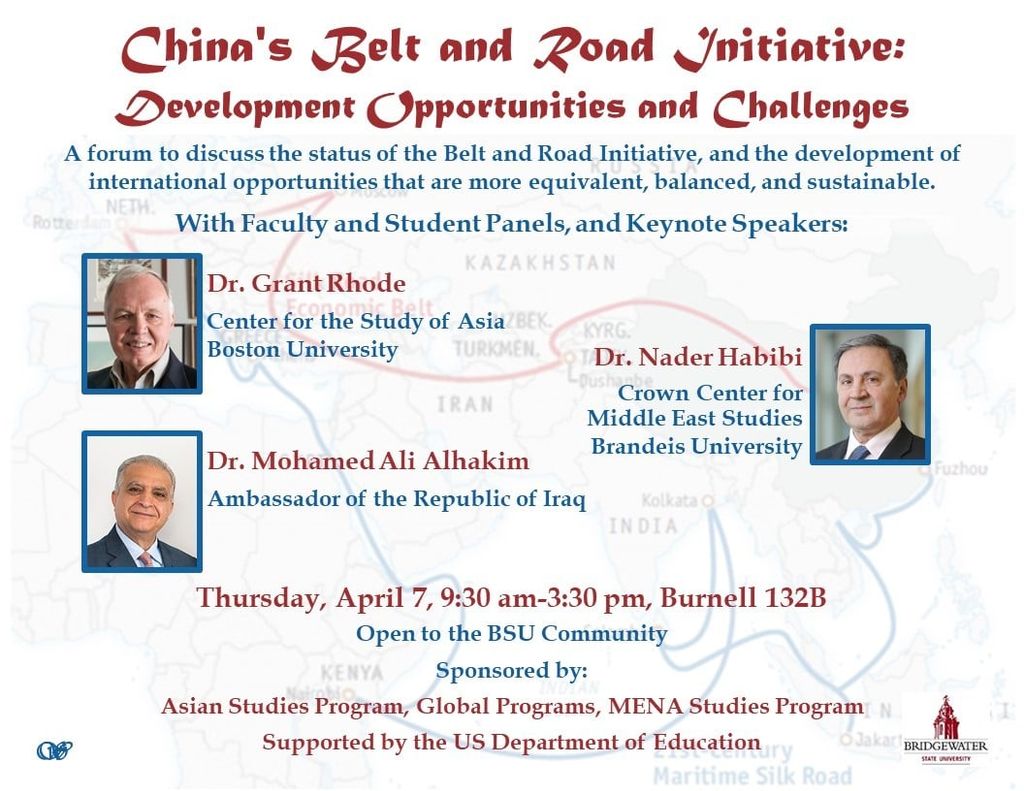
Classics as Protest: Ch’oe Inhun’s Kuunmong, with Dennis Wuerthner (April 15, 2022)
Presented by the BU Center for the Study of Asia Director's Lunch Speaker Series
Friday, April 15 at 12:15pm ET at 121 Bay State Road, Boston University.
Lunch will be provided!

About the Speaker:
Dennis Wuerthner is Assistant Professor of East Asian Literatures in Boston University's Dept. of World Languages and Literatures. He holds holds a PhD from Ruhr University Bochum in premodern Korean literature. His main field of research is Korean literature, history and culture in a broader East Asian context. Against a historic and literary-historic backdrop, in his monograph A Study of Hypertexts of Kuunmong, focusing on Kuullu / Kuun’gi (Frankfurt a. M.: Peter Lang, 2017) he discusses late Chosŏn dynasty parodic writings of the seventeenth century novel Kuunmong (A Dream of Nine Clouds), analysing the cross-border East Asian and inner-Korean diffusion, transformation and creative production of prose works, as well as the substantiation or revision of literary standards in and through parodic fiction. Literature- and knowledge-circulation between China, Korea and Japan likewise plays a vital role in his work on Kŭmo sinhwa (New Tales of the Golden Turtle). Results of his research have coalesced to form an in-depth study on Kŭmo sinhwa, which functions as an introduction preceding his complete and copiously annotated English translation of this early Chosŏn collection of tales by Sŏlcham Kim Sisŭp. It has been published in the AKS/UCLA Korean Classics Library under the title Tales of the Strange by a Korean Confucian Monk: Kŭmo sinhwa by Kim Sisŭp (University of Hawai’i Press, 2020). He also has a keen interest in modern and contemporary Korean literature and culture. For instance, he has written on the Transformations of Korean Classical Literature by Ch’oe Inhun, and worked on Korean Science Fiction and adventure-literature. North Korean treatment of classical Korean literature is another field of research. In his work as a translator, he also strives to cover both premodern and contemporary Korean works. His translations of contemporary authors comprise pieces by Ch’oe Inhun, Kim Hyesoon, or Hwang Jeong Eun. Currently he is in the final stages of an academic translation and study of the Koryŏ dynasty sihwa-collection P’ahan chip (Collection of [Poems and Stories] to destroy Idleness) by Yi Illo within the framework of the AKS Translation of 100 Korean Classics Project. In addition to courses in Korean literature, classical Korean, and classical Chinese, he has taught courses in Korean film, the Korean War, and popular culture, with an emphasis on the legacies of classical Korean literature and culture in the modern age.
Abstract:
In this talk I will discuss an adaptation of a Korean “classic” by Ch’oe Inhun (1936-2018), Kuunmong (1962), offering a comparative analysis of this work with its canonized Chosŏn dynasty model by Kim Manjung (1637-1692) to identify and interpret intertextual ties. It is hypothesized that Ch’oe Inhun’s highly unusual transformation of this classic – written in a South Korea churned by internal and external conflicts, during an age when historical and cultural memories were forged and a national heritage and identity designed to legitimize, demarcate and mobilize were created – constitutes a narrative of intellectual dissent. I will argue that Ch’oe Inhun’s Kuunmong, developing meaning and impact out of the creative interplay with its premodern model, can be understood as having been specifically geared to run counter to policies of simplification, linearization, collectivization and glorification of tradition brought forth by the government under Pak Chŏnghŭi (1917-1979).
